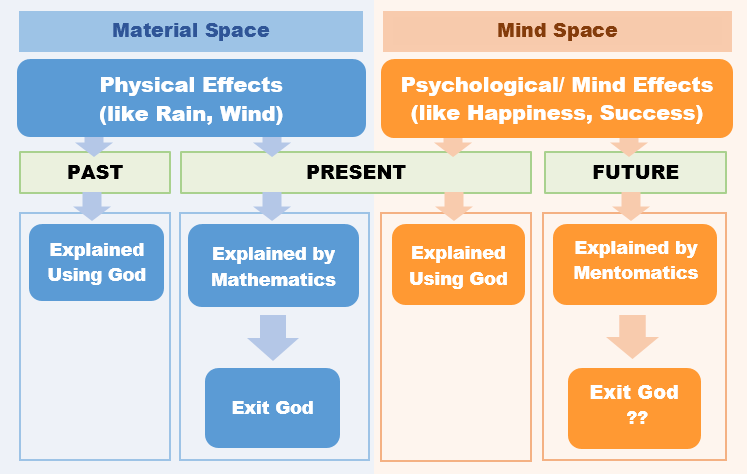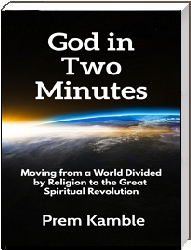Fig.1:
While science has helped us understand the vast universe around us,
the small
area within us which we call the Mind remains in the dark
(Image: Public domain-pixabay)
Summary:
Man has made giant strides in understanding the world around him. There was
a time when even physical world was shrouded in mystery. We did not know what caused
rain and wind, day and night, what caused disease and deaths. Everything
that was unknown was explained as work of god. Rain? Rain god. Wind? Wind god,
and so on. Science helped debunk most of the myths surrounding the physical world,
and the concept of god is no longer required to explain most of the physical phenomena.
However, even today, we find the concept of god handy to explain all that
is unknown.
While physics and mathematics have helped us to explain the world of
matter or the physical world, the world of Human Mind still remains
in the realm of the unknown, and hence in the realm of god. But science too
is constantly evolving. A new quantum science was needed to explain the subatomic
particles as classical physics failed to do so. Is it only a matter of time
before a new 'spiritual science' emerges to explain the unknown realm of
the mind, rendering the idea of god unnecessary to explain what is
unknown today? After all, god is no longer invoked to explain
natural phenomena like wind and rain.
If a new 'language' of Mathematics had to be discovered to explain most
of the once-unknown phenomena of the physical world such as rain and wind, do we need
a new language (let's call it 'Mentomatics')
to explain today's unknown phenomena of the mind?
The Known and the Unknown World
Man has made giant strides in comprehending the world he inhabits. He has unraveled and explained many of the laws governing the physical world and material space. His quest for knowledge has taken him far and wide, from exploring distant planets to venturing beyond the confines of the universe to understand his environment.
While science has greatly enhanced our understanding of the universe surrounding us, there remains an uncharted territory, an area yet unexplored and unexplained. There exists a small but significant realm very close to us which still remains shrouded in mystery - the realm within the human mind, or the intricate world within ourselves (Fig.1). Despite our advancements, we have not understood ourselves and the complexities of our own our minds.
We appear to be living in two worlds – the familiar physical world well explained and understood by science and mathematics, and an unknown world of our minds.
The Known World: The Material Space
Since some very staunch beliefs in the past have crumbled and appear ridiculously funny today, is it not possible that some of TODAY'S staunchest beliefs may also turn out to be myths?
We are familiar with the physical world which we can perceive with our eyes and experience with our senses. In the past, even the physical world was a mystery. Early humans did not understand basic physical phenomena. They were unaware of what caused day and night, why seasons changed, what brought rain and wind, and why there were diseases and deaths due to disease.
Driven by a desire to explain everything unknown around him, the ancient people started finding answers to these questions. What caused the wind? The wind god. Who created rain? The rain gods. It was believed that god was holding the earth on the shoulder so that we did not fall into hell. Lunar eclipses were attributed to daemons consuming the moon god. Many unexplained natural occurrences like lightning, earthquakes, and storms were attributed to the actions of gods and daemons.
Subsequently, the fields of physics and mathematics emerged, proclaiming that wind resulted from pressure differentials. Air consisted of minuscule, imperceptible particles and atoms that migrated from areas of high pressure to low pressure, thus generating wind. Who could have fathomed that what seemed like empty space around us was teeming with unseen particles, possessing weight and exerting pressure?!
Before the advent of science, anything unexplained was attributed to divine creation. History attests that all mysteries were ascribed to god. However, with the advent of science, the role of god in explaining natural phenomena diminished.
The Unknown World: The Mind SpaceTM

While we now know what makes the sun shine, what makes the celestial bodies go round the sun, and the intricacies of the distant stars, we remain baffled by our own behavior. We are clueless why we get upset, what makes us happy or unhappy, why we succeed on some days and fail on other, what makes us poor or rich. Why is it that a man with immense wealth may not be happy whereas a poor man can find contentment? Why do some days favor us while others do not? Why do we excel at a task one day and struggle with it another day? Essentially, we are strangers to ourselves.
While we have deciphered the laws governing the physical universe, we are entirely ignorant of the laws governing this strange world within our mind. While we have mastered Material Space, the domain of Mind Space™ remains shrouded in darkness.. (The ebook God in Two Minutes, available for download on Amazon, delves into Mind Space™ and its contrast with Material Space.)
We are ignorant of the dynamics of the phenomena within Mind Space - such as happiness, sorrow, success, failure, fluctuating moods, and unpredictable fortunes. Similar to how people once turned to gods to explain physical phenomena, the concept of god is often invoked to explain our emotional states and life circumstances.
So what brings you joy or despair? God makes you happy or sad. Who shapes your destiny? It is god again. God decides whether you will be wealthy or impoverished. Anything beyond our understanding tends to be attributed to god, much like how ancient civilizations explained natural occurrences like wind, rain, seasons, and eclipses. As we are unaware of the reasons behind events unfolding in our lives, the direction our life is heading, and the rationale behind it, we attribute the decisions about our lives to god.
Our primitive response to the question "What causes rain and wind?" should have been, "I don't know today. It may be explained tomorrow." However, our ego prevented us from admitting ignorance, leading us to invent explanations. Likewise, our response to the unknown today should be, "I don't know yet. Perhaps it will be elucidated in the future." We are currently in the infancy of understanding the science of our mind, but our ego often hinders us from acknowledging this fact. Consequently, we may still be concocting absurd explanations even today.
It is indeed conceivable that just as celestial bodies in the physical universe move around adhering to specific laws of physical science without requiring day-to-day divine intervention, our lives may also be governed by specific yet undiscovered laws of the universe or laws of mind or spiritual science.
Spiritual teachings often highlight principles such as "Do good and beget good" or "Perform your karma without attachment to outcomes" (as found in the following verse in Sanskrit Language from Hindu scripture Gita, with its meaning reproduced below)
"Karmanye Vadhikaraste, Ma phaleshou kada chana
Ma Karma Phala Hetur Bhurmatey Sangostva Akarmani"
which broadly translates to:
You have the right to work only but never to its fruits
Let not the fruits of action be your motive, nor let your attachment be to inaction
These principles suggest a framework of cause and effect in our lives that may operate based on spiritual laws akin to the laws governing the physical world. Do these spiritual principles, such as the one mentioned above, truly constitute the laws of spiritual science? We often hesitate to trust these laws and refuse to label them as "scientific" because they often do not yield the desired results for us. However, it is possible that their lack of effectiveness is not due to inaccuracies in the laws themselves, but rather because they lack the precise predictability and replicability that mathematics offers to the laws of the physical world and physical sciences. While these laws may not have been effective for all, they have been thoroughly explored, experienced, and applied by notable spiritual figures. Just as advancements occurred in physical science, the future holds unforeseeable possibilities. Perhaps a disciplines called "Mentomatics" and Spiritual Science will emerge, providing the same level of precision and replicability to the spiritual world that mathematics and physical science did for the physical world.
Future advancements in spiritual science could potentially provide more definitive answers to these questions related to the mental phenomena. It is possible that as spiritual science progresses and defines these laws with the precision and repeatability of mathematics or mentomatics, we may come to understand that our life events, much like celestial bodies, are not subject to constant divine intervention but are governed by well-defined, precise spiritual laws of the universe.
Myths and Beliefs
The history of physical science reveals that several theories were developed right from the Stone Age to explain the physical world. These theories were once widely accepted as absolute truth until new theories emerged, causing the old ones to collapse. For instance, there was a time when people believed the earth was flat, and that the sun revolved around it. These beliefs were held so strongly that opposing views were met with hostility, sometimes with violence.
Considering how some steadfast beliefs from the past now seem comical, we should be open to the possibility that some of our current beliefs may also prove to be unfounded. Our deep-seated faith in these theories often leads us to view any challenges to them as sacrilege. It is important to be mentally prepared to reassess and potentially discard some of our most strongly held beliefs today.
Early man's answer to the question ‘Who makes rain and wind?’
was ‘God’. The right answer should have been, ‘I don't
know’.
Today, our answer to all that is unknown should be ‘I don't know today.
It may be known tomorrow.’
We pamper our ego by claiming that we have progressed significantly compared to the old times of widespread ignorance. We believe we are much more knowledgeable now and mock ancient people as naive. However, if we project ourselves into the future and envision what the world might become, we will realize that we could be just as ignorant today regarding certain beliefs that could be debunked later. Our ego prevents us from considering that we might also be mistaken in our current beliefs
Could god be one of these misconceptions today? Similar to many myths from the pre-scientific era that have been disproven, is the concept of god a relic of a bygone era? Will humanity eventually elucidate spiritual principles as clearly and precisely as we currently understand physical laws of nature? If so, we, the people of today, may appear as foolish as ancient civilizations who believed in a flat Earth where one could fall off the edge.
Mathematics and "Mentomatics" - The Known and the Unknown
When mathematics emerged, the concept of god gradually receded from explanations of physical phenomena. Instead, these phenomena were elucidated through newly discovered entities and laws within the physical space, such as the gravitational law. Could it not be similarly possible that the phenomena of the mind, currently explained through the lens of god, could be explicated by yet-unknown entities and yet-to-be-discovered laws of the Mind Space?
There is merit in considering that our happiness, well-being, success, or failure may be influenced more by the state of our own mind than by external circumstances. We lack a comprehensive understanding of our mind's workings, including how our subconscious drives our actions and how our mental state shapes our destiny. The article "We Have No Control over Our Actions" (listed in "Related Readings" below) and the ebook "
God in Two Minutes" delve into how our thoughts and emotions influence our mental state. Our mental state, in turn, influences our destiny, and we play a significant role in shaping our lives and designing our future. However, we are confused about how events unfold in our lives. "God" explanation, therefore, comes in handy again.
Indeed, while mathematics has been highly successful in explaining and documenting phenomena within the physical space, it has struggled to elucidate the complexities of Mind Space™. This limitation could be seen as a significant bottleneck in our understanding of the mind. It begs the question: are we lacking a suitable language that could effectively explain the laws governing Mind Space? Is there a need for a new language of Mentomatics, that will enable us to comprehend and articulate the phenomena of Mind Space?

Fig. 2: Physical phenomena were formerly attributed to god until mathematics provided explanations.
Could the emergence of Mentomatics, a theoretical framework for understanding the mind, lead to a similar departure of god from explanations of mental phenomena?
The emergence of Mentomatics and mind science as a theoretical framework for understanding the mind could potentially revolutionize our approach to explaining mental phenomena. It might provide the tools and concepts needed to unravel the intricacies of the mind, including aspects like emotions, thoughts, and subconscious processes. Furthermore, Mentomatics could offer a more nuanced and scientifically grounded explanation for the mental phenomena and push the concepts of god and religion to realms of history (Fig. 2).
A Peep into the Future - THINK THE UNTHINKABLE
 Looking ahead, just as Physics and Mathematics liberated explanations from the realm of god for physical effects, Mentomatics holds the potential to offer god-free explanations for mental and mind-related phenomena. Similar to how mathematics provides predictability and repeatability in physical phenomena, Mentomatics may do the same for mental phenomena. This could enable us to not only understand but also prescribe and achieve desired states of mind to attain desired outcomes in life. It is conceivable that we may uncover methods and tools to swiftly create and access desired mental states within minutes.
Looking ahead, just as Physics and Mathematics liberated explanations from the realm of god for physical effects, Mentomatics holds the potential to offer god-free explanations for mental and mind-related phenomena. Similar to how mathematics provides predictability and repeatability in physical phenomena, Mentomatics may do the same for mental phenomena. This could enable us to not only understand but also prescribe and achieve desired states of mind to attain desired outcomes in life. It is conceivable that we may uncover methods and tools to swiftly create and access desired mental states within minutes.
Considering that god is perceived as a state of mind (as expounded in the ebook), the ability to reach
God in Two Minutes might become feasible. Instead of traditional temples, we might envision spiritual clinics that offer mentomatical solutions to help individuals achieve their desired mental states.
Will the advent of Mentomatics as a language to explain mind phenomena indeed lead to a departure of god from the realm of the mind, similar to how physics and mathematics diminished the need for divine explanations in the physical world (Fig. 2)?
Today we believe that god gives us the spiritual energy. A time will come when we will be able to know how to measure our spiritual energy and move from a low energy state of mind to high energy state in seconds. We will be able to attain god in seconds. Sounds impossible, right? But so would today's reality sound impossible to a Stone Age man - like living on a round earth floating in space, or flying in the air. Just as the Stone Age man has to think of the unthinkable to visualize today's inventions, we need to be able to THINK THE UNTHINKABLE to imagine the future world. We need to be mentally prepared for the impossible.
We talk about barbarians who lived on earth years ago who killed one another for food. The following quote from the book God in Two Minutes says it all: "A time will come when man will look back and say 'Once upon a time, there lived barbarians on this earth who believed in different religions and killed their fellow beings in the name of god.'"
Our current belief is that spiritual energy is bestowed upon us by god. However, the author envisions a future where we can measure and manipulate spiritual energy to transition from a low-energy state of mind to a high-energy state in mere seconds, even attaining a state akin to god in seconds. Sounds far-fetched, right? Yet, it is essential to remember that today's reality would have seemed equally implausible to a Stone Age individual - concepts like living on a round Earth suspended in space or flying through the air were once unimaginable. Just as the Stone Age person has to think of the unthinkable to envision today's innovations, we need to THINK THE UNTHINKABLE to conceive of the future world, and mentally prepare ourselves for the seemingly impossible.
Just as the Stone Age person had to contemplate the unthinkable to envision today's innovations, we must also be open to thinking of the unimaginable to conceive of the future world and mentally prepare ourselves for the seemingly impossible.
Reflecting on history, we often discuss about barbarians who lived on earth years ago and killed one another for food. A poignant quote from the book "God in Two Minutes" encapsulates this sentiment: "A time will come when humanity will look back and say, 'Once upon a time, there lived barbarians on this Earth who believed in various religions and killed their fellow beings in the name of god.'" This perspective reminds us of the potential for profound transformation and progress in our understanding of spirituality, religion and god.
Copyright © 2012-2023 Prem Kamble
eJournals where this article can be found
This article has been added to eLibrary as an academic paper in the following eJournals/Issues. You may need to login to ssrn.com site to view details of these journals. At this link at ssrn site, however, you can read the abstract of the paper and also download a pdf copy of the article. You do not need to log in to do so.
Go Top
Copyright © 2012-2023 Prem Kamble
|



